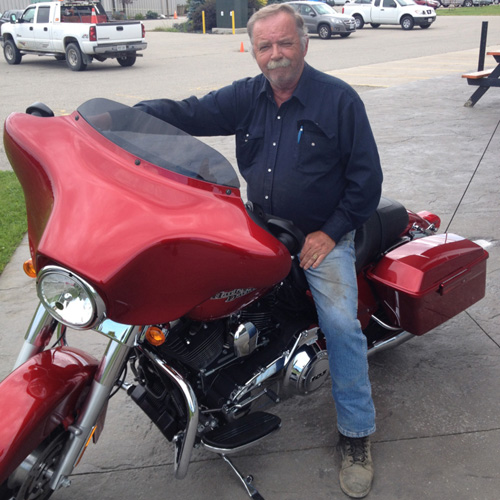
Heart transplant recipient Bill Best loves to ride his motorcycle and be a champion for organ donation. (Photo: Bill Best)
About a month after his heart transplant, Bill Best got on his motorcycle for the trip from Beamsville to Toronto for his regular check-up. The 6:00 a.m. 60-mile trip took about one hour, and Bill loved every minute of it.
"Sure, why not?" he responds when asked if he thought it was a good idea. "You have to live after your transplant. It's a mode of transportation between me and happiness."
Since then he has hopped on his 392 kilogram (865 pounds) black Harley Davidson to visit New Orleans, Florida, Arizona and South Carolina. "I just keep on going. I try to make the best of it – when I'm on the road or in the hospital."
And he does. Whether it's championing the benefits of Canadian health care with access for all to the Americans he meets on his travels, to cheering up patients waiting for a heart transplant or, in some cases, offering an "expert medical second opinion" to the physicians who do his post-transplant check-ups at Toronto General Hospital. He laughs that by now he could do his own biopsy, but that the paperwork required for the test would be "a killer." During a biopsy, small pieces of tissue are removed from the heart muscle to check for any signs of rejection, a process in which a transplant recipient's immune system attacks the transplanted organ or tissue.
Even when hospitalized due to heart and kidney failure, exhausted, swollen and wheezing with every breath, Best kept his and the other patients' spirits up with his jokes and messages of hope. "I had a good time there," he says of his stay at TGH while he waited for a new heart. "I knew everybody and how everyone was doing."
When Best received his heart transplant on September 18, 2008, he promised himself that he would try and help anyone else in the same situation. At any one time, he usually mentors two or three patients who are waiting for a heart transplant.
"You're in a different world waiting for a new heart," he says quietly, adding that he makes sure to keep in touch, visit and call those who are most vulnerable. "It's overwhelming. You've got to be gentle with people. People are waiting, they don't want to die. If I can have a quiet word with them, make them smile, offer them strength and hope, I know I have lightened the load."
Test Your Limits campaign
On September 14, 2014, Dr. Heather Ross embarked on the Snowman Trek in the Kingdom of Bhutan, climbing the spine of the Himalayas. Dr. Ross is the Director of the Ted Rogers Centre of Excellence in Heart Function at the Peter Munk Cardiac Centre and Medical Director of the Cardiac Transplant Program at Toronto General Hospital. She climbs to raise money and awareness for heart failure and heart transplant patients through the Test Your Limits Campaign.
"I'm quite lucky to be challenged and inspired by my patients and the incredible things that they do every day," she says.
For Dr. Ross, testing one's limits can come in many forms.
"Test Your Limits doesn't have to be about climbing a mountain. What you do in any given day – things happen, things are thrown at you, challenges come up that test you in different ways. They test your patience, they test your mental capacity, they test your work or your ethic – they test some aspect of your life."
Bill Best’s story is the last in a five-part series about how Dr. Ross' patients test their limits – every day.
Related Links
